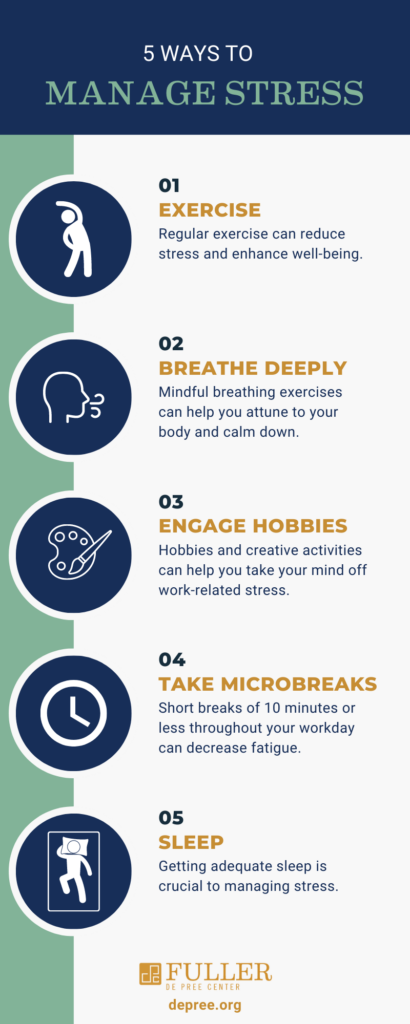Five Ways (Plus One) to Manage Stress
Chronic stress. It feels inescapable. The demands of life, work, and leadership seem relentless, practically snuffing out any room for margin. Whether it’s from never-ending deadlines, berating from a boss, poor performance from an employee, or a mistake on a P&L statement, ongoing, unmanaged workplace stress can wreak havoc on us.
Mitigating work-related stress requires a multi-pronged approach. Organizations need to examine their culture and leadership to determine the ways they could be eroding employee well-being. We need to evaluate what agency, if any, we have to advocate for change in our workplace or to find a new one. And we need to engage in practices that help us rest and relax.
Managing Stress as Spiritual Practice
For Christians, managing stress can be a spiritual practice. In Renovation of the Heart: Putting on the Character of Christ, Dallas Willard argues, “The body must come to serve us as a primary ally in Christlikeness. For good or for evil, the body lies right at the center of the spiritual life.” We care for our bodies because they’re the primary vehicle through which we serve God. Willard adds, “As a mature and competent individual, I am responsible for the care of my body, and it is the center of all other responsibilities I have.” Managing our stress is a matter of stewardship. It’s a way we care for ourselves so that we can offer ourselves to God and in service of others. So how precisely do we manage our stress?
… we need to engage in practices that help us rest and relax.
Five Ways to Manage Stress
In their book Burnout: The Secret to Unlocking the Stress Cycle, sisters Emily and Amelia Nagoski write about the emotional exhaustion that comes from chronic stress at work. They note that the stressors we experience cause a stress response in our bodies. They define stress as “the neurological and physiological shift that happens in your body when you encounter one of these threats.” And our stress response gets stalled out, causing us to get stuck if we don’t complete the stress cycle. Being stuck in the stress cycle damages our bodies. They prescribe, “Because you experience stress every day, you have to build completing the cycle into every day.”
So how do we complete the stress cycle and get unstuck? They offer the following options:
- Exercise
- Breathing
- Positive social interaction
- Laughter
- Affection
- Crying
- Creative Expression
Managing our stress is a matter of stewardship.
I consulted a few other sources on how to manage workplace stress, and I identified five practices common to most of the lists. You can see them depicted in the infographic below.

Exercise
The Nagoski sisters emphasize, “Physical activity is the single most efficient strategy for completing the stress response cycle.” But it can be difficult to squeeze in a workout between commuting, sitting at your desk, and shuffling kids around town. Maybe you can begin your morning with 20 minutes of HIIT or a quick yoga session. Perhaps you can walk on your lunch break. I’ve been known to pace my driveway for a solid 10-15 minutes after a stressful meeting.
Breathe Deeply
Slow, mindful breathing can lower our heart rate and blood pressure while giving us a mental break from our work as we focus our attention on our breath and our body instead of our stressors. Fuller’s Thrive Center has a 4-step mindful breathing exercise that you can practice at your desk.
Engage Hobbies
Do you have any hobbies? Sketching, word-working, baking, gardening, or playing the harmonica? It may be challenging to engage in our hobbies during work, but maybe we can find some time for them after work or on a day off. If you work from home, maybe you can squeeze in five minutes at the piano while refilling your coffee or making a cup of tea.
Take Microbreaks
I had never heard of a microbreak prior to working on this article, but it’s a very short pause (10 minutes or less) in work designed to help you reset and feel renewed before diving back in. Research shows that these little breaks can greatly impact our work engagement and overall well-being. The catch? The microbreak shouldn’t be related to your work. Don’t use the time to check email or tidy your workspace. Do something altogether different. You could do six minutes of desk yoga, listen to two of your favorite songs, go for a quick walk, eat a healthy snack, or practice mindful breathing.
Get Enough Quality Sleep
The Sleep Foundation reports that over one-third of adults in the United States get less than the recommended 7 hours or more of sleep each night. Sleep deficiencies not only impact our stress levels but also our overall health and well-being. According to the National Institutes of Health, “Sleep deficiency is linked to many chronic health problems, including heart disease, kidney disease, high blood pressure, diabetes, stroke, obesity, and depression.”
We’ve likely encountered numerous tips for improving the quality of our sleep. Here’s a list from the Mayo Clinic. Ironically, number 6 is all about stress management. Maybe that’s good motivation for us to try some of the other stress-relievers on this list.
One More Stress-Management Practice
If I were to add one more stress-management practice to this list, it would be prayer. From the Book of Psalms, we get a glimpse of King David as a leader. In 1-2 Samuel, we can read about the events that comprised his life, work, and leadership. But in the Psalms, we get to see his thoughts and his heart. David faced all sorts of stress–contending with enemies, enduring the slights of his adversaries, and seeking refuge from his foes. If the Psalms are any indication, we can infer that David regularly cried out to God, seeking God’s help.
Look at Psalm 18. Here David recounts a time when he called out to God and when God answered him:
“In my distress I called upon the
to my God I cried for help.
From his temple he heard my voice
and my cry to him reached his ears…
He reached down from on high; he took me;
he drew me out of mighty waters.
He delivered me from my strong enemy
and from those who hated me,
for they were too mighty for me.
They confronted me in the day of my calamity,
but the Lord was my support.
He brought me out into a broad place;
he delivered me because he delighted in me.” (Psalm 18:6, 16-19, NRSV)
1 Peter 5:7 encourages us, “Cast all your anxiety on him, because he cares for you” (NRSV). God may not deliver us from all of our stressors, but the Scriptures show us that God will certainly be present with us as our strength and our comfort as we contend with them.
A Prayer for Those Who Are Stressed
Sometimes it’s hard to know what to pray. Thankfully other faithful saints have given us their words to use in our time of need. I’m grateful for author K.J. Ramsey’s prayer collection, The Book of Common Courage. In the middle of one of her prayers, I found three simple lines that I believe can help us not only as a stress management practice but also as we engage in the other five. She prays to God,
“[S]peak life
into the empty space
of my depleted energy.”
That’s precisely what we need, right? We need the God of wind and waves, the One who hovered over the waters at the creation of all things, to breathe life into our weary and worn-out souls. Chronic stress can ruin and wreck us. Thankfully we serve a God who delights in rebuilding and restoring what’s been broken.

Meryl Herr
Director of Research and Resources
Dr. Meryl Herr is the Director of Research and Resources at the Max De Pree Center for Leadership where she designs and conducts research studies that add to the understanding of what helps marketplace leaders flourish. She also oversees the team’s efforts to convert research findings into r...


